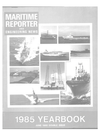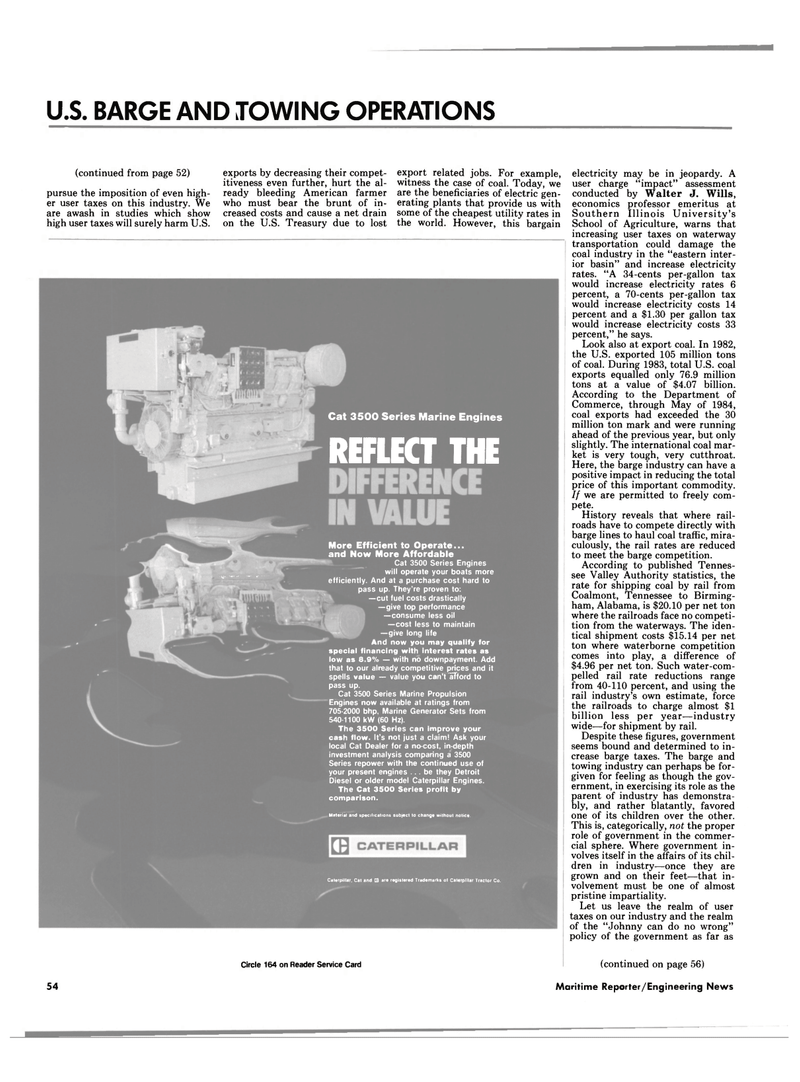
Page 56: of Maritime Reporter Magazine (June 1985)
Read this page in Pdf, Flash or Html5 edition of June 1985 Maritime Reporter Magazine
U.S. BARGE AND TOWING OPERATIONS (continued from page 52) pursue the imposition of even high- er user taxes on this industry. We are awash in studies which show high user taxes will surely harm U.S. exports by decreasing their compet- itiveness even further, hurt the al- ready bleeding American farmer who must bear the brunt of in- creased costs and cause a net drain on the U.S. Treasury due to lost export related jobs. For example, witness the case of coal. Today, we are the beneficiaries of electric gen- erating plants that provide us with some of the cheapest utility rates in the world. However, this bargain
Cat 3500 Series Marine Engines
REFLECT THE m mi —
More Efficient to Operate... and Now More Affordable
Cat 3500 Series Engines will operate your boats more efficiently. And at a purchase cost hard to pass up. They're proven to: —cut fuel costs drastically —give top performance —consume less oil —cost less to maintain —give long life
And now you may qualify for special financing with interest rates as low as 8.9% — with no downpayment. Add that to our already competitive prices and it spells value — value you can't "ifford to pass up.
Cat 3500 Series Marine Propulsion
Engines now available at ratings from 705-2000 bhp. Marine Generator Sets from 540-1100 kW (60 Hz).
The 3500 Series can improve your cash flow. It's not just a claim! Ask your local Cat Dealer for a no-cost, in-depth investment analysis comparing a 3500
Series repower with the continued use of your present engines ... be they Detroit
Diesel or older model Caterpillar Engines.
The Cat 3500 Series profit by comparison.
Material and specifications subject to change without notice.
Caterpillar, Cat and 03 are registered Trademarks of Caterpillar Tractor Co.
Circle 164 on Reader Service Card electricity may be in jeopardy. A user charge "impact" assessment conducted by Walter J. Wills, economics professor emeritus at
Southern Illinois University's
School of Agriculture, warns that increasing user taxes on waterway transportation could damage the coal industry in the "eastern inter- ior basin" and increase electricity rates. "A 34-cents per-gallon tax would increase electricity rates 6 percent, a 70-cents per-gallon tax would increase electricity costs 14 percent and a $1.30 per gallon tax would increase electricity costs 33 percent," he says.
Look also at export coal. In 1982, the U.S. exported 105 million tons of coal. During 1983, total U.S. coal exports equalled only 76.9 million tons at a value of $4.07 billion.
According to the Department of
Commerce, through May of 1984, coal exports had exceeded the 30 million ton mark and were running ahead of the previous year, but only slightly. The international coal mar- ket is very tough, very cutthroat.
Here, the barge industry can have a positive impact in reducing the total price of this important commodity.
If we are permitted to freely com- pete.
History reveals that where rail- roads have to compete directly with barge lines to haul coal traffic, mira- culously, the rail rates are reduced to meet the barge competition.
According to published Tennes- see Valley Authority statistics, the rate for shipping coal by rail from
Coalmont, Tennessee to Birming- ham, Alabama, is $20.10 per net ton where the railroads face no competi- tion from the waterways. The iden- tical shipment costs $15.14 per net ton where waterborne competition comes into play, a difference of $4.96 per net ton. Such water-com- pelled rail rate reductions range from 40-110 percent, and using the rail industry's own estimate, force the railroads to charge almost $1 billion less per year—industry wide—for shipment by rail.
Despite these figures, government seems bound and determined to in- crease barge taxes. The barge and towing industry can perhaps be for- given for feeling as though the gov- ernment, in exercising its role as the parent of industry has demonstra- bly, and rather blatantly, favored one of its children over the other.
This is, categorically, not the proper role of government in the commer- cial sphere. Where government in- volves itself in the affairs of its chil- dren in industry—once they are grown and on their feet—that in- volvement must be one of almost pristine impartiality.
Let us leave the realm of user taxes on our industry and the realm of the "Johnny can do no wrong" policy of the government as far as (continued on page 56) 54 Maritime Reporter/Engineering News

 55
55

 57
57
